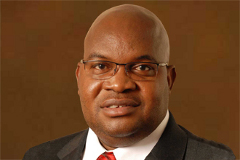Bribery and corruption
South Africa's fight against bribery
|
Masenyani Richard Baloyi, Minister of Public Service and Administration of the Republic of South Africa In 2007, South Africa signed up to the OECD Anti-Bribery Convention and joined the Working Group on Bribery in International Business Transactions, a group made up of representatives from all 38 signatory countries which monitors the convention's implementation and enforcement.
In June 2010, the working group completed its second-round evaluation of South Africa. It said South Africa has come far in fighting bribery but could do more. South Africa's Minister for Public Service and Administration, Masenyani Richard Baloyi, heads the South African delegation to the OECD's Working Group on Bribery. We asked him about the evaluation and the role his country plays in the global fight against bribery and corruption.
OECD: Minister Baloyi, the working group just completed its second evaluation of your country's implementation and enforcement of the Convention on Combating Bribery of Foreign Public Officials in International Business Transactions. What were the results of this evaluation?
Mr Baloyi: Well, on a very positive note, the w orking g roup says South Africa has a very strong legislative framework for combating foreign bribery under our Prevention and Combating of Corrupt Activities Act, which our government passed in 2004.
That said, convention countries are held to the highest standards, which is why working group reports are often very hard-hitting. This report is no different. In short, it says South Africa has taken positive steps but needs to step up its efforts to detect, investigate and prosecute cases of bribery in international business deals.
What were the group's main recommendations?
The recommendations are tough, but they do offer important ways in which we can improve our efforts to stop the bribery of public officials in other countries by South African individuals and companies in their cross-border business deals.
For instance, we need to do more to raise awareness of foreign bribery in our public and private sectors, and to increase law enforcement resources and training for those charged with enforcing our foreign bribery offence. We also need to make sure there is better coordination among our police and prosecution authorities, the group said. All of this, they feel, should help us better detect, investigate and prosecute cases of foreign bribery. The report also recommended that we do more to hold South African companies duly liable for committing this crime.
It sounds like implementing those recommendations will not happen overnight. How does South Africa plan to address the recommendations?
All of the OECD's recommendations were made in order to make our legal framework stronger, and to make it easier for us to protect our citizens and companies from the risks associated with foreign bribery. We're getting there. There are currently four foreign bribery investigations underway. This is progress.
So, of course, we welcome the recommendations. We will study the report and look for ways that we can apply them to our work here in South Africa.
Why is it important to South Africa to follow the OECD's advice in strengthening its anti-bribery framework?
It's true that being party to the Anti-Bribery Convention means a lot of work and, often, some pretty harsh advice.
But, as a member of the Working Group on Bribery, we get to sit at the table with 37 of our peers who, together, make up nearly two-thirds of the entire world's exports. Together, we have recognised how disruptive the bribery of foreign public officials in international business transactions is to the global market. If one of us cheats and lets our bribers off easily, then we all pay the price.
Day-to-day, it means that South Africa has a better corporate reputation and investment climate. Our individuals and businesses are held to a higher standard; their clients can therefore have more confidence when doing business with them. That is a huge benefit.
South Africa is the only African country that has adopted the OECD Anti-Bribery Convention. What kind of responsibility comes with that role?
The consequences of foreign bribery are not just economic or financial. This crime also undermines good governance and stands in the way of sustainable development. In Africa, these are consequences that hit especially hard. We see firsthand the disruption that takes place when governments are undermined by bribing individuals and companies. And in almost every instance, those who are hurt most by this crime are the poorest and most vulnerable.
We hope to set an example for our neighbours, many of whom do business with other countries in the region. If they follow our lead-even if they are not party to the convention-then we can go far in reducing the levels of corruption in Africa. We also hope that, by properly enforcing the Anti-Bribery Convention, South Africa sends a message to the outside world that bribing African public officials is wrong and will not be tolerated.
What does South Africa add to the strength of the Anti-Bribery Convention?
Well, our economy is the biggest in Africa and one of the world's biggest up-and-coming markets. If we agree that these rules are important and should be followed, I think that lends real credibility and relevanc e to the OECD and the c onvention. And, our membership sets a good example for other non-OECD countries that are considering joining the c onvention, like China, India and Russia. Here, we are treated as equals. We carry the same weight of responsibility, but we also enjoy the same benefits. Interview by Mary Crane, OECD.
|
||
|
Recommended links and references
OECD ( 2010) , South Africa: Phase 2 ( second-round evaluation of South Africa by the Working Group on Bribery ) , available at www.oecd.org/dataoecd/8/39/45670609.pdf
For more on the OECD Anti-Bribery Convention, see www.oecd.org/corruption
|
Related Documents
